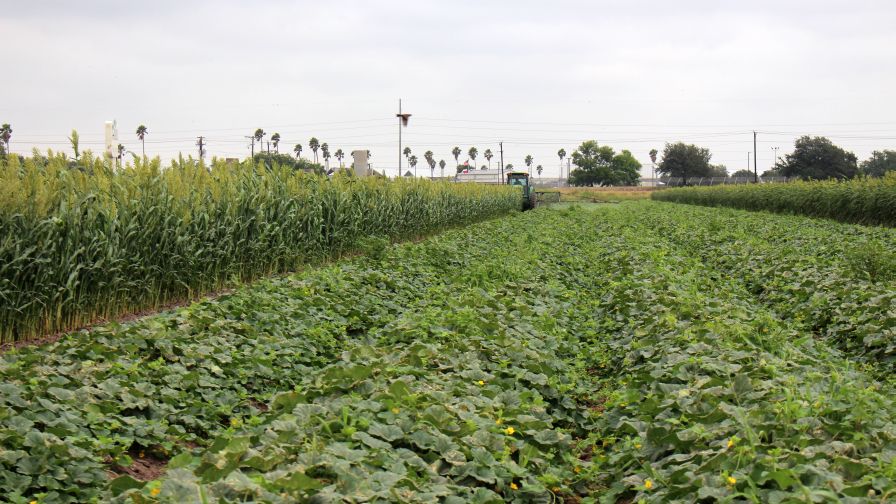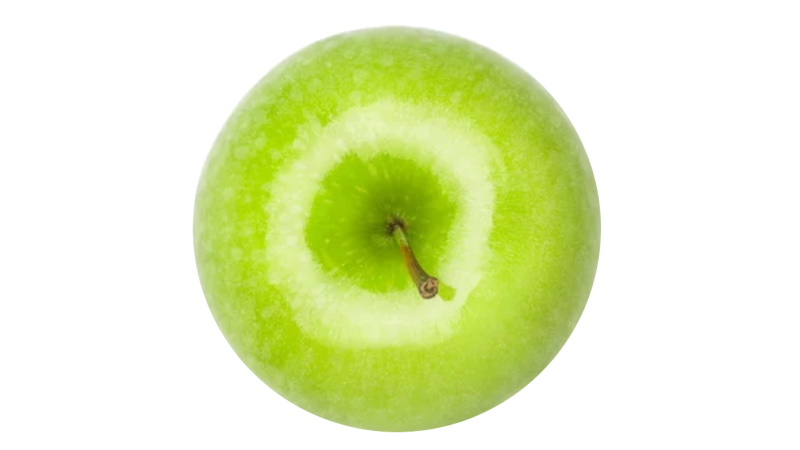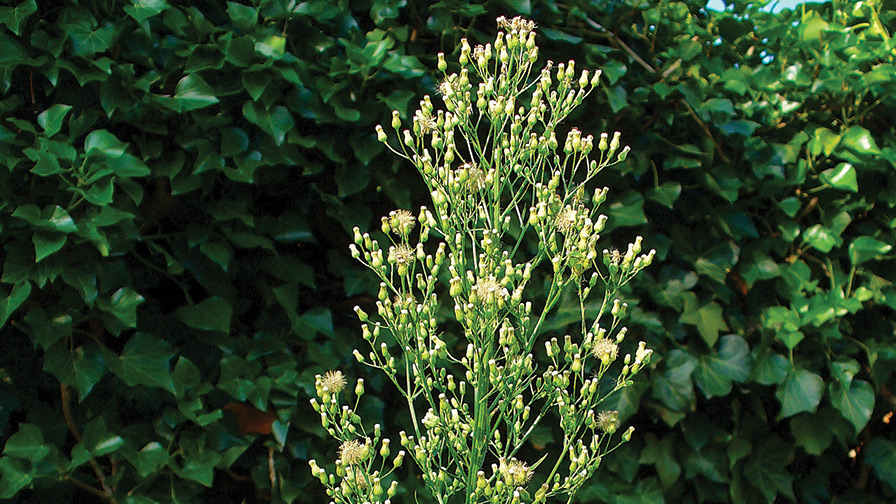Apple Growers Of The Year: An Unmatched Work Ethic
Bill and Jeannette Evans, who’ve been married now for 67 years, are a throwback pair. Bill looks the quintessential veteran cowboy-type, tall with an ambling gait. He peers at you with piercing blue eyes, issuing words like they were gold coins. Jeannette isn’t exactly chatty herself, but with a palpable fighting spirit, she might be described as spry. Though it’s likely no one ever describes her in such a way, as it makes her sound old, and no one would say that.
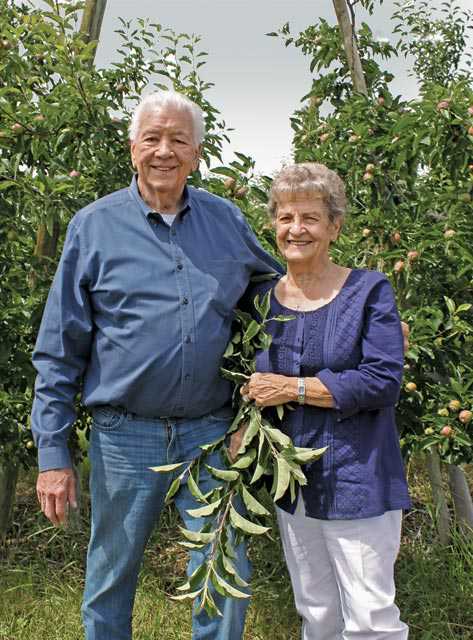
Bill and Jeanette Evans
One recent day at Evans Fruit in Cowiche, WA, just outside Yakima, she was found smack dab in the middle of the sales desks, talking away on the phone. This is nothing unusual. Though the Evanses are in their mid 80s, they both work full time — and then some. Climbing into their SUV for a tour of their orchards, Jeannette has to move a box out of the way she uses in late June to take samples of fruit from their cherry orchards.
“We work six days a week and on Sundays we make the rounds of the orchards — and that’s a full day,” she says.
All that hard work has not gone unnoticed. Bill and Jeannette Evans received not just one or two nominations as American and Western Fruit Grower’s 2014 Apple Growers of the Year; a whole host of growers backed them for the honor. (See “Conspiracy Born Of Respect.”)
Depression Roots
Like a lot of Great American Success Stories, the Evanses’ tale begins in The Great Depression. Bill’s dad, Guy Evans, brought his family to Washington from Arkansas in 1936 in search of work.
“Basically we were migrant workers,” Bill says.
Guy Evans got a job at C.M. Holtzinger as a foreman, and that’s where Bill started too, removing suckers and thinning at the age of 12 for 50 cents an hour.
They bought their first piece of property in 1949, a 10-acre parcel on Tieton Drive.
“We still have it, too,” Jeannette says proudly.
Bill nods in agreement and says: “We just kept adding and adding and adding from there.”
They built their first packing shed in 1959, in Naches Heights. By then they already had four children — they would have a total of five — and they were busy people.
“We had to work like beavers to feed them,” Jeannette says. (Years later their two oldest sons passed away, and the other doesn’t work in the business. Their two daughters are involved, as are some of their grandchildren.)
Eastward Expansion
Besides packing their own fruit, another move that paid off was they were one of the first growers to plant apple trees in the Mattawa area, about 75 miles east northeast of Yakima.
“Everybody thought it was too hot,” Bill explains, “but I looked at the water rights and saw we could do overhead cooling when the temperatures got up to 85 degrees.”
So in 1980 they began overhead cooling of orchards in Mattawa. Jeannette also inherited some land in the area, and they purchased more, and today they farm 2,700 acres there. If you add that to the 6,000 acres they farm in the Moxee and Yakima areas — 90% apples, the rest cherries — they farm more apple acreage than any grower in the country.
“That’s what they tell us,” Mrs. Evans says casually, but not without a hint of pride.
Spreading Risk
Spreading their acreage out over a wide geographical area is another strategy that has really paid off. First, it spreads out the risk of getting hit by hail, which can wreak havoc if you farm numerous contiguous orchard blocks. Just last year alone, Bill says they lost a total of 240,000 bins to hail.
Second, their orchards are located at a variety of elevations, which means the apples ripen at different times, allowing them to get by with “only” 2,500 workers or so at harvest time, when they are picking 15,000 to 18,000 bins a day.
“We start in the lower elevations and keep working higher,” Bill says. “If they all came off at one time it would be mission impossible.”
In addition, Bill likes farming at higher elevations. While the yields might not be quite as high, the fruit is of exceptionally high quality and stores extremely well.
Careful Spending
The Evans are also risk-averse when it comes to borrowing money. They have been careful not to overextend themselves, and pretty much pay as they go, Jeannette says.
“We were burned very badly in the first few years by biting off more than we could chew,” she says. “The lesson I would tell the kids and grandkids is don’t ever extend yourselves and be careful how you invest your money.”
They’re really looking forward to showing their grandchildren how to succeed.
“We’ve got grandchildren coming into the business and they’ve got some learning to do,” she says. “But they will, they’ve got enough of their grandparents in them.”
Work Ethic
Success will only come, however, if you hire the right people, say both Evanses.
“Surround yourself with as good a people as you can find,” Jeannette says. “You’re as good as the people you surround yourself with.”
Pay particular attention to what skills potential employees bring with them, and how ready they are to adapt to change.
“In this day and age you have to depend so much on technology,” she says. “Some are technologically inclined, others aren’t. If you’re not, get some people who are because it seems to be going that way more and more.”
Above all, though, if you are single-minded about success, you’d better hire people who share your mindset.
“We try to pick really good supervisory people whose work ethics are wonderful and will get out and do whatever it takes to do the job,” Bill says. “We owe a lot of (our success) to the people who work for us.”
Conspiracy Born Of Respect
In his 30-plus years in the fruit industry, Keith Mathews says he has worked with virtually every large grower in the southern half of Washington. Prior to taking his current job as CEO of FirstFruits of Washington, which represents Broetje Orchards, he served as executive director of the Yakima Valley Growers-Shippers Association.
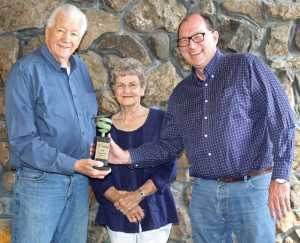
Bill and Jeannette Evans receive the award for Apple Growers of the Year from American and Western Fruit Grower editor David Eddy.
Through the years he has seen many industry giants in Washington recognized as Apple Grower of Year, such as Bill Zirkle, Tom Mathison and Ralph Broetje himself.
“When I looked around this year, I thought Bill and Jeannette Evans were somewhat overlooked,” he says. So Mathews began conspiring to get the Evanses nominated, and when he was done, the couple had received more than a dozen nominations, far more than any American and Western Fruit Grower has received for an apple grower in a single year.
“I did orchestrate a bit of a campaign,” he admits, “but it sure didn’t take much of a push.”
Mathews says he has admired the Evanses for a long time for starting with nothing and working their way up. His father-in-law, Virgil Doty, grew up with Bill Evans, and they sold Evans Fruit’s Top Red label for years. He said on top of everything else, two things stand out.
“First, Bill Evans is renowned for being one of the best Red Delicious growers in the world,” he says. “Second, they are packing in excess of 10 million pounds of their own apples every year. It’s quite remarkable.”
Other Voices
Here are some comments from some of other growers who nominated Bill and Jeannette Evans. Every one of those interviewed commented on their extraordinary work ethic.
Ray Keller, Apple King: Keller first met Bill Evans in 1964, when he had only about 100 acres of apples, and was struck by the fact that Evans was determined not to borrow any money.
“If he needed more money, he just worked harder; I’m sure he didn’t sleep for days. We all did some of that, but not to the degree he did. They are quite a team,” he says.
West Mathison, Stemilt Growers: The Evanses are together on so many levels, husband and wife, business partners, a team.
“They’re inspiring, Bill and Mrs. Evans. They make you think: I can do that.”
For them growing apples isn’t a job; it’s a vocation, a lifestyle, he says.
“People like that put it all together fluidly. There’s a mastery in what they’re doing. Like Michael Jordan playing basketball, there is no wasted energy, ‘fluid’ is the best way to describe them. They are very calm in the face of difficulty,” Mathison says.
Rod Matson, Matson Fruit: Matson hosted a fundraising dinner for a gubernatorial candidate at his house, and the Evanses came. Bill said something about being out before, on Sundays, to check out a central leader training system.
“I never knew that, and that was our farm!” he says.
There’s no secret that Bill Evans is all about Evans Fruit. But then years ago Matson served with him on the board of the Yakima Valley Growers-Shippers Association.
“When the meeting started, he was all about what was good for the industry,” he says.
Mac Riggan, Chelan Fresh: Riggan had lunch one day with the Evanses many years ago. The meal was rather unremarkable for what was said, but he never has forgotten about how Bill treated Jeannette.
“As a young guy then, it left a lasting impression on my heart and on my mind about how I need to be as a man toward my wife. It was a good thing for me to witness,” Riggan says.
Red Delicious A Mainstay — For Now
Beginning about 15 to 20 years ago, many Washington growers saw that Red Delicious apples — by far the state’s leading variety for decades — were losing favor with consumers. They began pulling the trees out. But, not Bill and Jeannette Evans.
“It’s been reds that have been our bread and butter over the years,” Jeannette says.
Two-thirds of their apple acreage is still Red Delicious. That’s partly because Bill likes growing Red Delicious, and he’s really, really good at it. It’s also because the beautiful typey Red Delicious he grows are still in favor in many parts of the world where they ship them, such as China, Russia, the Middle East and Scandinavia.
But things are changing at Evans Fruit. They’ve been planting different varieties in the past several years. Incidentally, if you think Bill is resting on his laurels, you should know that this octogenarian has been planting 100,000 trees a year over the past seven to eight years.
“That’s one thing about farming, you have to keep up, you have to reinvest,” Jeannette adds.
This year they planted mostly Galas and Fujis, specifically Aztec Fujis. All are planted on a V-trellis, 1,300 to 1,400 trees per acre.
They also planted Honeycrisp, which Bill Evans believes will remain profitable for several years. But eventually, the extra costs of Honeycrisp production — especially all the calcium sprays to ward off bitter pit and having to clip the fruit at harvest instead of just picking it — won’t be covered by the high prices.
“Honeycrisp will be good, but it won’t stay where it’s at past 2020 or 2022,” he says.





